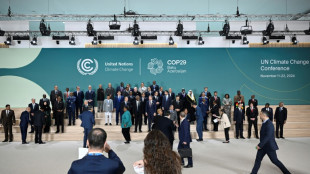
-
 South Africa send Wales crashing to 87-year low in Test rout
South Africa send Wales crashing to 87-year low in Test rout
-
Spurs condemn Man City to fifth straight defeat as Arsenal win

-
 Defeated Leipzig lose more ground on Bayern, Frankfurt go second
Defeated Leipzig lose more ground on Bayern, Frankfurt go second
-
South Africa put Wales to the sword to wrap up season

-
 Spurs thrash Man City 4-0 to end 52-match unbeaten home run
Spurs thrash Man City 4-0 to end 52-match unbeaten home run
-
Defeated Leipzig lose more ground on Bayern

-
 Venezuela opposition calls for 'enormous' anti-Maduro protest
Venezuela opposition calls for 'enormous' anti-Maduro protest
-
Inter take Serie A lead as AC Milan and Juve bore in stalemate

-
 England captain George wary of Jones's influence on Japan
England captain George wary of Jones's influence on Japan
-
Thousands demand lower rents at Barcelona demo

-
 'Puzzle' master Sinner powers champions Italy back into Davis Cup final
'Puzzle' master Sinner powers champions Italy back into Davis Cup final
-
Odegaard inspires Arsenal to reignite title hopes

-
 Marseille down Lens to stay in touch with Ligue 1 leaders
Marseille down Lens to stay in touch with Ligue 1 leaders
-
Novak Djokovic: All-conquering, divisive tennis superstar

-
 Scott Bessent a credible, safe pick for Treasury: experts
Scott Bessent a credible, safe pick for Treasury: experts
-
World approves UN rules for carbon trading between nations at COP29

-
 Putin signs law letting Ukraine fighters write off bad debts
Putin signs law letting Ukraine fighters write off bad debts
-
Thousands march against Angola govt

-
 Ireland coast to victory as they run Fiji ragged
Ireland coast to victory as they run Fiji ragged
-
Atletico make comeback to beat Alaves as Simeone hits milestone

-
 Aid only 'delaying deaths' as Sudan counts down to famine: agency chief
Aid only 'delaying deaths' as Sudan counts down to famine: agency chief
-
Leipzig lose more ground on Bayern with Hoffenheim loss

-
 Arsenal back to winning ways, Chelsea up to third in Premier League
Arsenal back to winning ways, Chelsea up to third in Premier League
-
Sinner powers Davis Cup holders Italy past Australia to final

-
 Andy Murray to coach Novak Djokovic
Andy Murray to coach Novak Djokovic
-
Leipzig lose ground on Bayern, Dortmund and Leverkusen win

-
 Fear in central Beirut district hit by Israeli strikes
Fear in central Beirut district hit by Israeli strikes
-
Chinese film about Covid-19 wins Taiwan's top Golden Horse prizes

-
 Tuipulotu puts anger behind him as he captains Scotland against native Australia
Tuipulotu puts anger behind him as he captains Scotland against native Australia
-
Inter smash Verona to take Serie A lead

-
 Mass rape trial sparks demonstrations across France
Mass rape trial sparks demonstrations across France
-
Lebanon says 15 killed in Israeli strike on central Beirut

-
 Eddie Jones will revel in winding up England - Genge
Eddie Jones will revel in winding up England - Genge
-
Chelsea see off Leicester on Maresca's King Power return

-
 Storms bring chaos to Ireland, France, UK
Storms bring chaos to Ireland, France, UK
-
Berrettini gives Italy edge on Australia in Davis Cup semis

-
 Amber Glenn storms to gold in Cup of China
Amber Glenn storms to gold in Cup of China
-
High-flying Chelsea see off Leicester

-
 Climate-threatened nations stage protest at COP29 over contentious deal
Climate-threatened nations stage protest at COP29 over contentious deal
-
Families fleeing after 32 killed in new sectarian violence in Pakistan

-
 Ancelotti says 'ugly' to speculate about Mbappe mental health
Ancelotti says 'ugly' to speculate about Mbappe mental health
-
Failure haunts UN environment conferences

-
 Colapinto in doubt for Las Vegas GP after crashing
Colapinto in doubt for Las Vegas GP after crashing
-
Lebanon says 11 killed in Israeli strike on central Beirut

-
 Three arrested in Spain for racist abuse at Liga Clasico
Three arrested in Spain for racist abuse at Liga Clasico
-
Pope to skip Notre Dame opening for Corsica visit

-
 Tokyo police care for lost umbrellas, keys, flying squirrels
Tokyo police care for lost umbrellas, keys, flying squirrels
-
Neuville closes in on world title after Rally Japan recovery

-
 Jaiswal slams unbeaten 90 as India seize control against Australia
Jaiswal slams unbeaten 90 as India seize control against Australia
-
'Nice surprise' for Verstappen to edge Norris in Las Vegas GP qualifying


After Davos, a race for money to stop climate change
US climate envoy John Kerry bluntly summed up in one word what the planet needs to avoid a global warming catastrophe at the World Economic Forum this week: money.
The annual meeting of the global elite in the Swiss Alpine resort of Davos was a chance for top government officials, CEOs, academics and campaigners to debate how to tackle the climate crisis.
The bill is monumental: Kerry and others warned that trillions of dollars were needed to speed up the world's efforts to reach net-zero carbon emissions by 2050 and limit warming to 1.5 degrees Celsius.
But the week-long forum exposed fault lines over how to meet those targets at a time when the world faces a costly war in Ukraine, an economic downturn, soaring inflation and a cost-of-living crisis.
The US government is pouring $369 billion dollars into its green energy transition through tax incentives and subsidies for electric cars and other technology under its landmark Inflation Reduction Act (IRA).
Kerry warned however that public funds alone were not enough, as he used his Davos appearance to press his case that the private sector has a major role to play -- if firms can be shown there is money to be made.
The former US secretary of state admitted that he sounded like the corporate raider Gordon Gekko from the film "Wall Street" when he said earlier this week that "money, money, money, money, money, money, money" was needed to meet the 1.5C target.
"The magic that we need is to unleash those trillions of dollars that are looking for good investments, but they're looking for bankable investments," Kerry said.
But at the same panel, Ecuadoran climate activist Helena Gualinga said profit was being placed above the health of the planet.
"When I hear a lot of these conversations I think it's very business first, and then we'll deal with climate and then we'll deal with biodiversity loss," she said. "That needs to be reversed."
- US-EU spat -
Other disagreements returned to the fore in Davos.
While many praised US President Joe Biden's IRA programme as a game-changer for the climate crisis, Europeans continued to denounce what they describe as discriminatory subsidies favouring US businesses.
The two sides held talks in Davos as they seek to find a compromise.
"We're friends," Kerry told AFP. "We need to work together and I think there's a lot of listening going on and discussions to address those things that are concerns."
European industrialists said the EU should step up its game and respond with its own version of the IRA if it wants to remain competitive.
"Yes, we are going to the US. We are taking the cheque from IRA, and fair enough," Ilham Kadri, CEO of Belgian chemicals giant Solvay, said at an event hosted by Belgian Prime Minister Alexander De Croo.
European Union chief Ursula von der Leyen announced plans in Davos for a special fund and a "Net Zero Industry Act" to defend Europe's industrial base from US and Chinese industrial subsidies.
- Western 'hypocrisy' -
IMF chief Kristalina Georgieva voiced concerns that Western efforts to use public money to step up private investment could be detrimental to developing nations, which are the most exposed to the effects of climate change.
"If we are to strive to get the industrialised world clean and we don't think about the emerging markets, we are all cooked," she said Friday.
Wealthy nations have already fallen behind on their pledges to deliver $100 billion per year to help developing countries green their economies and build resilience against future impacts of climate change.
Climate financing will be among the core issues to be discussed at the COP28 summit hosted by the United Arab Emirates later this year.
The president of the Democratic Republic of Congo, Felix Tshisekedi, slammed the "hypocrisy" of criticising his country for wanting to exploit fossil fuels for its development while wealthy polluters have failed to provide the money promised to help its energy transition.
"I think this money would allow us to get the technology faster if everyone kept their word," Tshisekedi said.
O.Lorenz--BTB




